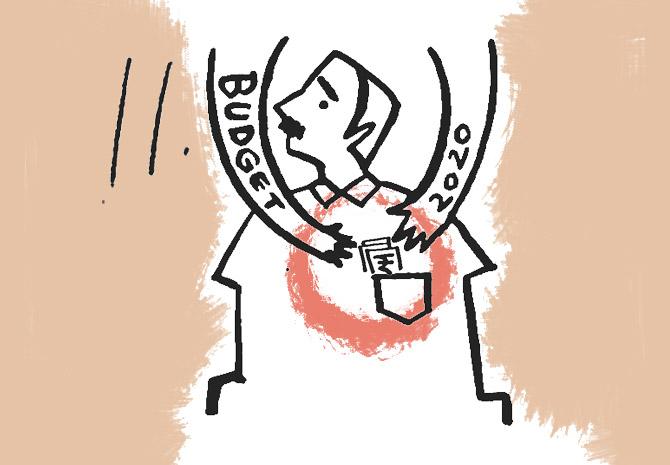'Nirmalaji's Budget announcements have long-term implications and are not backed by enough money when the short-term outlook looks bleak', notes T N C Rajagopalan.

In her Budget speech, the finance minister announced a number of initiatives to help exporters in the medium to long term.
Exporters could see these in the context of allocations and steps taken just before the Budget presentation.
The minister announced a new scheme, NIRVIK, to provide for higher insurance coverage, lesser premium for small exporters and simpler procedures for claim settlements.
She proposed to digitally refund to exporters, duties and taxes levied at central, state and local levels, such as electricity duties and value added tax on fuel used for transportation, which are not getting exempted or refunded under any other existing mechanism.
She said institutional mechanisms were being created to develop each district as an export hub.
She talked of schemes to encourage manufacture of mobile phones, electronic equipment, semi-conductor packaging, technical textiles and medical devices and a new logistics policy.
Also, fishery export and time-bound adoption of mandatory technical standards, their effective enforcement and issue of quality standards by various ministries.
She announced the provision of Rs 27,300 crore for development and promotion of industry and commerce for 2020-2021.
The allocation of Rs 12,824 crore in FY21 for the ministry of commerce and industry, net of receipts, shows a reduction of Rs 875 crore from the revised estimates for FY20.
At Rs 6,219 crore, the department of commerce gets about 14 per cent less.
The NIRVIK scheme gets Rs 95 crore, whereas there is a cut of Rs 568 crore under the interest equalisation scheme.
Export Credit and Guarantee Corporation gets Rs 650 crore (against Rs 1,700 crore announced last September).
On the National Export Insurance Account, the entire allocation is withdrawn.
There are also some issues of arithmetic and presentation in these expenditure statements.
A better explanation from the government will help.
Only three days before the Budget, the finance ministry notified the new duty drawback All Industry Rates for export made from February 4 onward.
These show a reduction for many items.
For example, on many chemical items (chapters 28 to 39), the rate has gone down from 1.5 to 1.3 per cent.
A similar 0.2 per cent reduction is seen for a number of engineering items.
The reasons for these are not clear, but it appears, the drawback rates have been cut by 0.2 per cent on many items with a view to save on revenue.
The ministry should clarify the reasons.
On January 29, two days before the Budget, the directorate general of foreign trade issued Public Notice 58/2015-20, withdrawing benefits under the Merchandise Exports from India Scheme for items in the apparel and garment sector, with retrospective effect from March 7, 2019.
The notice prescribes a revised procedure for claiming benefits under the Rebate of State and Central Taxes and Levies (RoSCTL) scheme, and a procedure for recovering any excess/undue claims paid under RoSCTL or MEIS.
The finance minister's statement that a scheme for 'Reversion of duties and taxes on exported products' will be launched this year is a repeat of her statement last September about the RoDTEP scheme.
That was to replace the MEIS scheme by December but might now happen by April this year.
Overall, it is difficult to get enthused by announcements that have long-term implications and are not backed by enough money, when the short-term outlook looks bleak.











